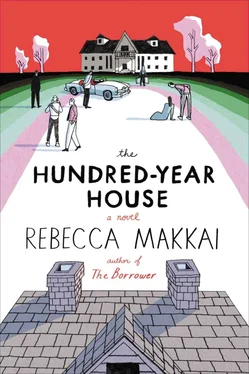“Eddie, what’s wrong with him? Can you get Viktor some water?”
Samantha nodding to Armand. Yes, go ahead, do it, whatever it is.
“Miss Horn will join us, yes! And Miss Silverman as well! But—”
Armand’s clothes off, Gamby’s off, Zilla’s off too. Marceline backing toward the house. The sun beginning to set.
“It’s the way the natives fish!”
“Here, get your head up! Don’t drown.”
And the two of them, Armand and Gamby, out of the water. Who had kept the fire going? Laughing and laughing, and no one could stop laughing.
Armand, grabbing: “Look, I caught a fish!” Moving the other’s plump hand: “Look, you caught one too!”
Laughter and the click of the Leica and the low red sun, and the light of the fire. No one could stop laughing.
It was dark so fast, and they couldn’t remember how.
Viktor, somewhere out in the dark. No one could find him. They could hear him, but they couldn’t find him.
In the humid night, some of them stumbled together, and some stumbled farther apart.
ZILLA IN THE DARKROOM, GAMBY IN THE DARK
First she points it at the back of the big house and clicks through the rest of the film. Thirteen photos of abandoned windows, lit orange by the setting sun. Up there, the room where she slept on her first visit, before there were beds in the Longhouse. The yellow room at the other end, where Viktor once stayed. The solarium studio, Fannie and Josephine’s sculptures shining like living things. The dining room, where she’s fallen in some sort of love with every artist and composer and writer who’s ever sat across from her.
The sun is gone as she gropes her way down the path to the darkroom cabin. She’s been developing Lemuel’s prints for years, doing half his work, really, and even in this unfamiliar space it takes her little time to sort things out. All the chemistry she needs is here: a jackpot of not quite empty bottles left by departing photographers. Tanks and reels. An ancient ruby light, with a funny little door. But no photographic paper. No matter, if the negative is clear and convincing. She takes her time lining things up left to right on the counter. Developer, stop bath, fixer. She makes sure the sink works.
(At this same moment, back on the lawn: Gamby, somehow both drunker and more sober, lunges at Fannie. He says, “Hey, wait, where’s your camera? Wait!” “Good gracious, it wasn’t my camera,” Fannie says.)
She turns off the electric lamp and feels her way back to the counter. It’s a relief not to see her hands anymore, the upside-down script: He loves you . Well, yes. Eddie didn’t know what he was doing, writing on them like that. He imagined he was pointing out something they didn’t both already know.
(It has started to rain again, to pour. Marlon wakes up on the terrace and wonders why he’s in a pool, why he’s underwater, how he can breathe underwater. He goes back to sleep. Gamby is looking for Armand. He’s shouting.)
Her hands are shaking so that she can’t get the film hooked onto the reel. She has no idea if the light was enough. She has no idea if the shutter clicked at the right moment. If everything’s a blur. At last she gets it engaged, begins reeling. One long strip of gray. The images hidden under that gray, waiting. Backward through time. This first half will be empty house. Somewhere in the middle here will be Gamby and Armand, the four shots she managed. The last bit should be Marlon’s shots — yesterday, and the day before, and the day before. She finishes, and traps the whole thing in the aluminum canister, and hopes, as she pours, that the bottle of developer is correctly labeled, that it isn’t someone’s old supply of bathtub gin. It smells right at least. She closes the canister and turns the lamp back on. She sits on the counter to agitate. She goes by her watch to time the moving meditation — the front of her wrist, the back of her wrist — and the periods of rest.
(Eddie and Armand, behind the composer’s shed, in the rain. The coin has been replaced by Armand’s tongue. Eddie Parfitt, despite his considerable success, his poetry collections, his awards — Eddie Parfitt is twenty-one years old. He has lived a thousand years in those twenty-one. But he has never been in love.)
The stop bath, the fixer, the water. The water, at least, she can trust.
(Viktor, back in the house alone. Picking up the book Zilla left in the library — Keats’s letters — opening it to the middle: He smells it.)
She feels that Eddie broke something tonight. By writing it out, so starkly, so stupidly, on their hands.
(They are starting without her. Ludo walks Gamby in, drenched and confused, face like a mole forced above ground, and sits him in the solarium among Fannie and Josephine’s sculptures.)
At last, she can allow herself to look at the negatives, to see the damage. She finds scissors first, a good sharp pair hanging from a nail. She opens the canister and slowly unspools the reel. The first frames, of the house, she snips off. A blurry shot of the two men, so unclear that they might as well be monkeys. The next one, yes, as she hoped: everything clearly visible, everything anatomical and precise. Gamby’s face, as clear as a mug shot. And Armand’s as well, and his body, and the sinews of his legs. The head of his penis, fat and soft.
(Samantha says, “You’re a businessman, Mr. Devohr.”)
She cuts the good shot loose and hangs it to dry. Then she spools back through the shots Marlon’s been taking all week. A close-up of a daylily, meant to be artistic. Samantha on her balcony. The giant oak, the two houses, Armand smoking a cigarette. Eddie, smiling uncomfortably on the terrace. Fannie and Josephine walking by the fountain, but obviously posed. Perhaps because she’s already in an agitated state, perhaps because of the awkward subjects, Zilla finds these photographs all unduly chilling. What should be so troublesome about two women walking the path? Only she can’t shake the feeling that the photographs have existed all along, have been waiting in their canister for a thousand years, and that the people in them have lived their whole lives just to end up in these exact positions, just to hit their marks like dancers. Certainly this is what happened to Gamby, every moment of his life leading him right into this photograph, this trap. They got him to stand just so. They got him entwined with Armand. And he became the picture.
(Eddie’s been summoned to the solarium as a bodyguard. All five and a half feet of him, arms like — well, like a poet’s. Armand hiding in the library, for his safety. Eddie slips his coin back in his mouth, where it now belongs. Samantha, in a molten voice Eddie didn’t know she had in her: “Mr. Devohr, Armand Cox is a known homosexual.”)
Zilla realizes something, and it takes her a minute to wrap herself around the idea. She’s always thought of Laurelfield as a magnet, drawing her back again and again. But that’s just it: A magnet pulls you toward the future . Objects are normally products of their pasts, their composition and inertia. But near a magnet, they are moved by where they’ll be in the next instant. And this, this , is the core of the strange vertigo she feels near Laurelfield. This is a place where people aren’t so much haunted by their pasts as they are unknowingly hurtled toward specific and inexorable destinations. And perhaps it feels like haunting. But it’s a pull, not a push. She doubts she can express it to anyone else, and she doubts she ought to.
(Gamby, no more blood in his face, sunken back in the chair, surrounded: “What in the hell do you people want?” Samantha still sitting, but she might as well be flying above him, Athena in the sky: “We want twenty-five years.”)
Читать дальше












